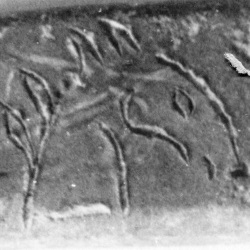The Mycenaean Epigraphy Room’s collections include the original letters written by Michael Ventris and John Chadwick over a period of four years, from July 1952 to shortly before Ventris’ death in September 1956. These letters offer an insight into the close collaboration between the two which resulted in their two joint publications, ‘Evidence for Greek Dialect in the Mycenaean Archives’ (Journal of Hellenic Studies, 1953) and Documents in Mycenaean Greek (Cambridge, 1956). The letters have recently been digitised with support from the Chadwick Fund; a small selection is presented here to give an overview of the correspondence.
first letter to Ventris, July 13 1952
Within a few days of receiving a copy of Ventris’ work from Sir John Myres, Chadwick was convinced the decipherment was correct, and wrote to congratulate Ventris, offering his help in a typically self-deprecating fashion: “if there is anything a mere philologist can do”. Already in this first letter he was able to suggest a sound-value Ventris had not yet worked out: assigning one of the undeciphered signs the value pu enabled him to read, among other words, the name ‘Pylos’ itself.
Ventris wrote back straight away (though probably not on the same day, as the dates on the letters suggest – one must be incorrectly dated). Not only did he gratefully accept Chadwick’s offer of help (“I’ve been feeling the need of a “mere philologist” to keep me on the right lines”), he also asked him to collaborate in publishing the decipherment.
Letters from Greece
Both Chadwick and Ventris made several trips to Greece to study the original tablets (and, in Ventris’ case, to work as a draughtsman on archaeological excavations on the island of Chios); they kept in close contact via letters to discuss progress on Documents in Mycenaean Greek or inform each other of new discoveries.
In this letter Ventris sends Chadwick details of some unpublished tablets from Pylos listing furniture – chairs, tables, and footstools – whose Linear B names and ideograms he has written; Chadwick’s pencil annotations of this vocabulary list can also be seen. Both Ventris and Chadwick worked in the archaeological museums in Athens and Herakleion, Crete (near Knossos), checking the readings of published tablets and copying newly-discovered ones: many of their letters are long lists of transcriptions of tablets.
from Chadwick, April 7 April 1955
 Much of Chadwick’s time in the Herakleion Museum was spent identifying fragments that would join together to make whole tablets. On p.2 of this letter he describes his famous join of the ‘horse tablet’ Ca 895 – a tablet found by Sir Arthur Evans with ideograms of horses on it, similar to the picture on the right. The piece Chadwick joined to the beginning of the tablet had the Mycenaean word hikkwos (spelt i-qo in Linear B) written on it – the equivalent of later Greek hippos, ‘horse’. Like the ‘tripod tablet’, this was a dramatic confirmation of the correctness of the decipherment.
Much of Chadwick’s time in the Herakleion Museum was spent identifying fragments that would join together to make whole tablets. On p.2 of this letter he describes his famous join of the ‘horse tablet’ Ca 895 – a tablet found by Sir Arthur Evans with ideograms of horses on it, similar to the picture on the right. The piece Chadwick joined to the beginning of the tablet had the Mycenaean word hikkwos (spelt i-qo in Linear B) written on it – the equivalent of later Greek hippos, ‘horse’. Like the ‘tripod tablet’, this was a dramatic confirmation of the correctness of the decipherment.
Linear B postcard, June 7 1955
Chadwick wrote this postcard in Linear B to tell Ventris, who was in Greece at the time, that the manuscript of Documents in Mycenaean Greek had been submitted for printing.
